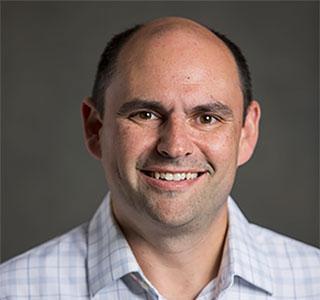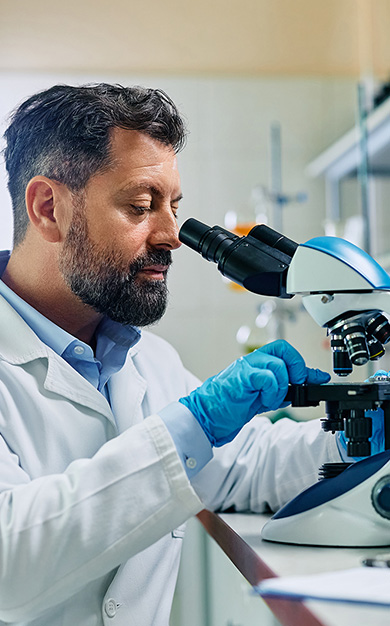Direct from the Experts—How Diet and Microbiome Impact AMD
Written By: BrightFocus Editorial Staff
Written By: BrightFocus Editorial Staff

Sheldon Rowan, PhD, has researched how various dietary habits worldwide can impact the risk of age-related macular degeneration (AMD). In 2017, he received a BrightFocus Macular Degeneration Research (MDR) grant to investigate the relationship between diet, gut bacteria, and AMD risk in an animal model, which is expected to provide some of the first evidence of a direct connection.

Recently, Dr. Rowan was an expert guest on the BrightFocus Chat series. The following Q&A presents highlights from that conversation.
Dr. Rowan is an assistant professor of ophthalmology at Tufts University School of Medicine in Boston, MA, and is a scientist on the Nutrition and Vision Research Team at the Jean Mayer USDA Human Nutrition Research Center on Aging, located at Tufts.
BRIGHTFOCUS: What led you to become a vision scientist?
DR. ROWAN: I became a scientist pretty much right out of high school. When I started my Ph.D., I fell in love with vision research. I’ve been working in the eye for about 25 years. I decided I was more interested in working in a human disease–relevant area, so I’ve been studying age-related macular degeneration.
BRIGHTFOCUS: Big picture—how does your diet impact your eyes?
DR. ROWAN: Our diet is a bigger determinant in our eyes than anyone would have guessed, and part of that is just because our diet is such a fundamental source of our physiological health. Our well-being, our metabolism is controlled by our diet.
With diet, we think about micronutrients and macronutrients. The micronutrients are things like vitamins. We’ve known for a long time that the vitamins that we get from our diet can have a big impact in our risk for macular degeneration. Macronutrients as well—the amounts of proteins, the amounts of carbohydrates and fats—in our diet can also have a significant impact on our risk. And then, all of that converges with what our diet does to our gut and microbiome, which is kind of a new frontier in understanding relationships between our environment, our diet, and our well-being.
BRIGHTFOCUS: What is a dietary pattern, and can you give us examples of good and bad ones?
DR. ROWAN: The dietary pattern is that summary of all of the foods that you tend to eat on a general basis. In America, there are two big-scale dietary patterns. We think about the Western dietary pattern; this is our typical diet, that’s not necessarily the healthiest diet for us. It’s the one that we like to eat, that has the pizza and French fries and red meat and sugar-sweetened beverages. And then you have the prudent diet, the one that scientists and nutritionists and dietitians have been telling us to eat, the one that’s more based on plant-based foods and fish and lean poultry.
BRIGHTFOCUS: How do these dietary patterns impact AMD?
DR. ROWAN: Americans that eat this Western dietary pattern have a really increased risk for advanced macular degeneration, also earlier macular degeneration. Whereas those that eat the prudent dietary pattern had a really dramatically decreased risk for both.
BRIGHTFOCUS: What foods are good for vision health?
DR. ROWAN: The Mediterranean diet is the one that we’ve studied the most and that I’m most excited about. What makes a Mediterranean diet a little different from the standard recommended diet is it also includes a high intake of nuts, olive oil—a lot of sources of monounsaturated fatty acids. And then besides the olive oil and the nuts, there’s high intake of fish, maybe more than once a week, and just lots of fruits, lots of vegetables, especially green leafy vegetables and legumes; those are all what I would say are the cornerstones of the Mediterranean diet pattern.
BRIGHTFOCUS: What’s the other side of the coin—the foods that we should eat less?
DR. ROWAN: Within the Western dietary pattern, foods that are high in saturated fats—fried foods—have definitely been independently linked to risks for macular degeneration. And our research has also looked at carbohydrate quality, at foods that have a high glycemic index that are rapidly digested into simple sugars in our blood streams. Those are also associated with increased risks for macular degeneration.
BRIGHTFOCUS: How have we learned all this?
DR. ROWAN: Most of what we know about diet is coming from observational studies. They tend to be large collections of individuals—tens of thousands or hundreds of thousands of people—and we’ve collected data about them at the beginning of the study and then followed them through a study. Those studies can take a really long time; there are some populations and cohorts that we’ve been following up for decades.
Of course, the challenge in all of that is, in epidemiology, you always talk about association. It’s very hard to prove causation.
BRIGHTFOCUS: “Microbiome” is one of those words you hear it a lot in the media, but I’m not sure that a lot of us truly understand. Could tell us about the gut microbiome and how that impacts AMD?
BRIGHTFOCUS: All of the different kinds of bacteria, and fungi and viruses; it’s a huge kind of ecosystem that lives inside us. A healthy gut microbiome has been associated with lower rates of chronic disease.
It is hard to exactly define what’s a healthy versus an unhealthy microbiome, but we know that there are things that can go wrong with our gut microbiomes, especially when they become imbalanced. For example, an antibiotic may be killing off a lot of the beneficial bacteria and allowing undesirable ones to expand. Those are often associated with inflammatory conditions, and inflammation is, we think, one of the contributors to macular degeneration.
Knowing the connection between gut microbiome and AMD is in its early stages. We know from animal model experiments that there’s potentially beneficial functions of the gut microbiome that directly seem to keep the eye healthy, and we also know that there are functions of gut microbiome that can increase inflammation that could make other kinds of models of AMD worse.
BRIGHTFOCUS: Can probiotics help?
DR. ROWAN: You don’t want to start outcompeting another kind of bacteria that might end up being important. So, probiotics are tricky. I’m really excited in using probiotics to test ideas about how different bacteria may be working together in the body and to affect the eye. But I don’t know if people should really be experimenting on themselves to that degree. We know it’s safe to eat a Mediterranean diet; that’s definitely safe. We don’t actually know how safe a lot of probiotics are.
BRIGHTFOCUS: Is it better to eat the actual food itself or take a supplement?
DR. ROWAN: We know that the whole food always has the benefit. We don’t know if you can isolate that. Fruit juice doesn’t work the same way that eating the whole fruit does. So, I always go for the whole food versus a supplement.
BRIGHTFOCUS: Changes to diet can be challenging. Is there a good starting point?
DR. ROWAN: A lot of people struggle with their diets. The best approach is to start to make small substitutions with things that you don’t mind sacrificing, for example, changing that white bread to a whole-grain bread. Switch over the ham for turkey. If you’re used to eating fruit juice as part of your diet, have the fruit instead. If you’re trying to force yourself to eat something you don’t like, just because you know it’s good for you, you’re probably not going to stick with it.
BRIGHTFOCUS: In terms of scientific progress, how are we doing in terms of better understanding and treating and, hopefully, curing AMD?
DR. ROWAN: We’re definitely there with wet macular degeneration; we’ve made huge steps. I think that for dry macular degeneration, we’re so close. I’ve seen early results from a number of studies that look so promising.
I’m really excited about the Mediterranean diet, too. On a public health level, I’m excited that’s something people can start to change in their lives. They don’t have to wait to have the disease. They don’t have to do this under instruction of a clinician or as part of a clinical trial.
And there are other lifestyle changes that work together with the diet. For example, not smoking, and also exercise, could be something that independently lowers your risk. One study looked at this. They found people that adhered to a healthy eating index, got a lot of exercise, and didn’t smoke, had 71 percent lower odds of early macular degeneration. I don’t think drugs are going to be able to give us that same kind of effect.
BrightFocus Foundation is a premier global nonprofit funder of research to defeat Alzheimer’s, macular degeneration, and glaucoma. Since its inception more than 50 years ago, BrightFocus and its flagship research programs—Alzheimer’s Disease Research, Macular Degeneration Research, and National Glaucoma Research—has awarded more than $300 million in research grants to scientists around the world, catalyzing thousands of scientific breakthroughs, life-enhancing treatments, and diagnostic tools. We also share the latest research findings, expert information, and resources to empower the millions impacted by these devastating diseases. Learn more at brightfocus.org.
Disclaimer: The information provided here is a public service of BrightFocus Foundation and is not intended to constitute medical advice. Please consult your physician for personalized medical, dietary, and/or exercise advice. Any medications or supplements should only be taken under medical supervision. BrightFocus Foundation does not endorse any medical products or therapies.
Help Fight Macular Degeneration and Save Sight
Your donation helps fund critical research to bring us closer to a cure for this sight-stealing disease and provide vital information to the public.
Donate Today